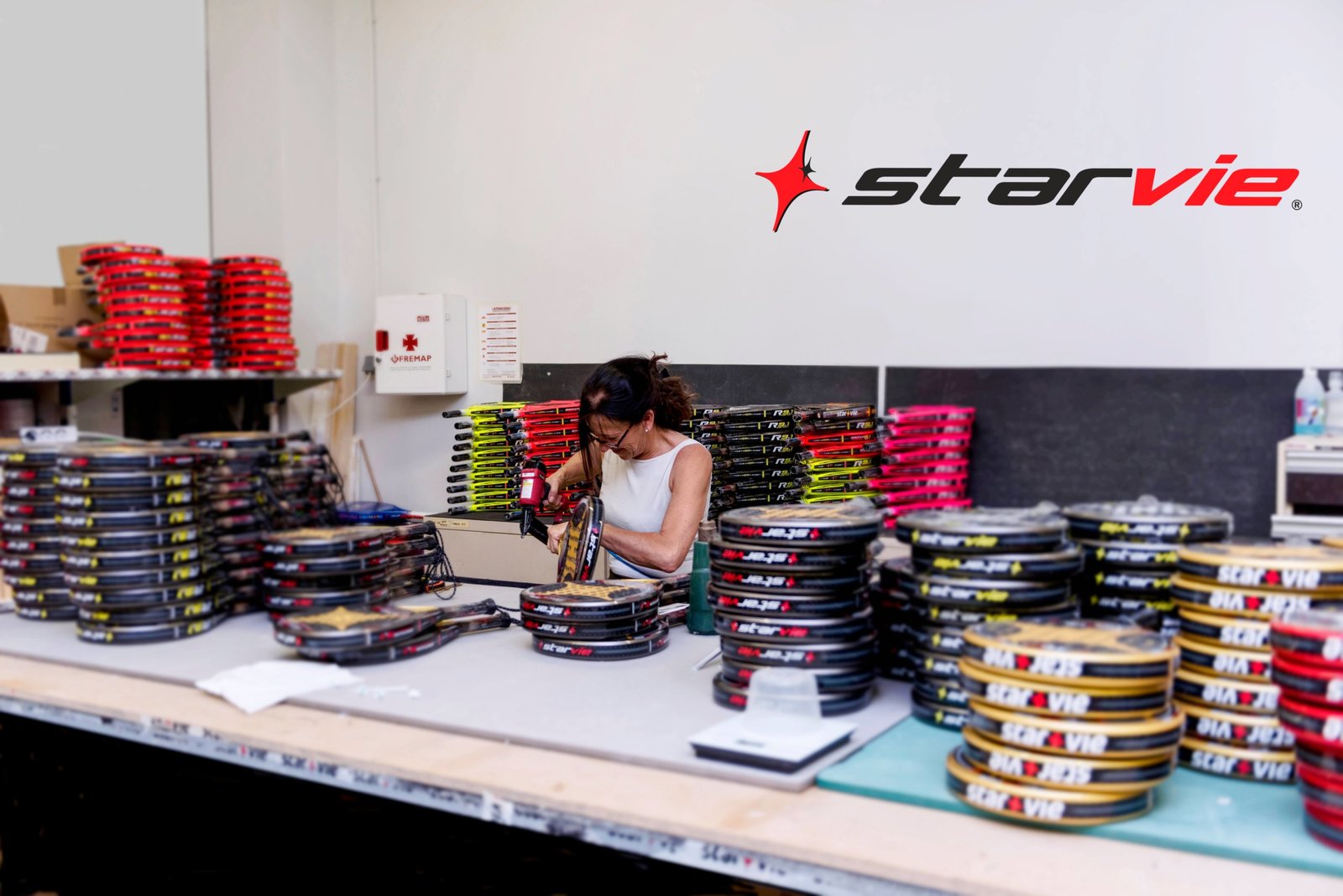StarVie rackets are produced following a craft production process 100% made in Spain. This process is divided in 9 different stages that take place in the factory that StarVie owns in Azuqueca de Henares (Guadalajara, near Madrid). There, a team of 22 people work tenaciously to deliver the well-known StarVie rackets.
StarVie factory was born in 2013 with the clear goal to control every single detail in rackets’ production process. The factory has 2.000 m² and 2 padel courts in it to test the new models and materials.

PRODUCTION PROCESS OF STARVIE RACKETS
1. DESIGN STAGE: This stage is developed in StarVie’s headquarter office in Madrid in collaboration with the factory. StarVie invests a lot of time, money and resources on its R&D department where they continuously look for new materials, moulds, designs and shapes to improve all mechanical and aesthetic aspects.
2. DIE-CUTTING STAGE: Materials arrive to the factory in reels or sheets where they are cut with the shape’s mould. EVA rubber and fibre knitting such as carbon, aramid, basalt, aluminium and glass are set depending on the model, aiming to provide different feelings while playing.

All materials used come from first quality suppliers and they all fulfil technical aspects required by StarVie. These materials are also used in different industries like aeronautical industry, automobile industry, etc.

3. SHAPING RACKET BODY STAGE: Materials cut on the previous stage are impregnated by epoxy and placed inside an aluminium mould in a specific way depending on the model we are making. Afterwards, this aluminium mould is located inside an oven with a specific temperature and for a specific time. This is one of the most important stages of the whole process because it sets racket’s quality and therefore its playability.
In order to control the quality of the racket in this stage, we randomly choose 1 racket every a hundred and we cut it right in two to check if it is in perfect conditions and reach all StarVie quality standards.
4. REMOVE SURPLUS MATERIAL STAGE: in this stage we remove all surplus materials and hand wash them with soap to let it ready for the next stage.
5. PUTTY SMALL RACKETS IMPERFECTIONS STAGE: after putTing all materials together in a certain temperature in the SHAPING RACKET BODY STAGE, it appears some imperfections when we separate the mould from the racket. In this stage, these small defects are filled with putty and fixed immediately.


6. PAINTING STAGE: here it starts the painting process. This stage is done in a special cabin where we hand paint and lacquer every racket. This is a handmade process so there is no machinery involved.
7. STICKER PLACING STAGE: all rackets stickers are placed in this stage when paint, from the previous stage, is totally dried. StarVie rackets are also very well-known for their designs. From our point of view it is very important that our rackets are beautiful and very well-finished so we dedicate huge efforts to reach customer expectations.


8. DRILLING PROCESS STAGE: this is the only stage of the whole production process where we use machinery. It is the part we drill rackets according to a hole map each model has. This unique hole map provides different mechanical features to each model.
9. FINAL STAGE: this is the last step of the whole process. Here, a person is in charge to manually place cord, cap and grip as well as the wrapping plastic on the handle.


StarVie factory currently produces 2,500 units per month and depending on the model the process lasts from 10 to 14 days and it involves 22 people in total.
STARVIE FACTORY QUALITY CERTIFICATES
Quality is the cornerstone of StarVie rackets and our quality system is registered to ISO 14001:2015 and ISO 9001:2015 for our Factory in Azuqueca de Hernares and is subject to continuous improvement through our total quality management procedures and statistical process control techniques. While ISO 14001:2015 certifies our environmental management system the second one, ISO 9001:2015, certifies our process quality system. These two ISO certificates are for 4 years, until 2020 where they have to be renewed.



